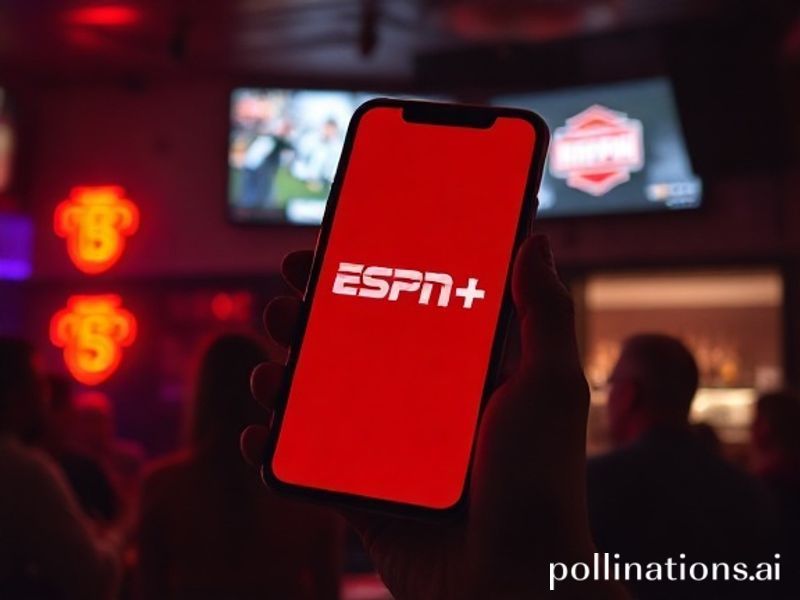espn+
ESPN+ at Five: A Digital Gladiator in Rome, Streaming Blood Sport for the Post-National Age
By Our Correspondent Somewhere Between Geo-Blocked and Existential Despair
In the beginning, ESPN+ was pitched as a polite annex to the American living room—an extra $9.99 a month to watch a few more games your cable bundle forgot. Five years later, it has metastasized into a 24-million-subscriber colossus that now exports American athletic anxiety to 190 countries, whether those countries asked for it or not. The platform’s latest quarterly report, quietly slipped into Disney’s earnings like a horse’s head in a studio bed, reveals the real sport: global market share by any means necessary.
Consider the scene in Lagos, where Arsenal die-hards gather in a plywood bar to stream the Emirates via ESPN+’s Latin American feed. The stream hiccups, buffers, then dies—yet the patrons cheer louder for the spinning circle than for the goal, because at least the circle belongs to them. In Jakarta, a 14-year-old cricket prodigy studies slow-motion MLB pitching on the same app his father uses to rewatch 30-for-30 documentaries about doping scandals. Two generations, one algorithm, zero irony.
The international expansion playbook is textbook neo-imperialism with better graphics. ESPN+ buys local rights to Bundesliga in Malaysia, La Liga in Canada, and KHL in places that still pretend the KHL is a going concern. Then it bundles them with the US Open Cup, a tournament Americans themselves ignore, creating a kaleidoscope where a Kolkata student can watch Tulsa Roughnecks lose to a team named after a brand of Mexican cement. Cultural exchange, meet brand synergy.
Naturally, governments are catching on. France slapped Disney with a 3% “digital services” tithe—essentially charging rent for the privilege of pumping American shoulder pads into Gaul. India, still sour after Star Sports was devoured by the mouse, floated a law requiring foreign streamers to carry 30% local content. Disney responded by green-lighting “Cricket & Curry,” a docuseries that follows Virat Kohli as he eats regional street food between net sessions. Soft power, medium spice.
The darker joke is what ESPN+ does to time itself. A Spurs-Chelsea match kicks off at 3 p.m. London, which is 10 p.m. Manila, 4 a.m. Bogotá, and “should I divorce him o’clock” in households where one spouse refuses to learn VPNs. The platform’s elegant solution: spoiler-free replays, delivered with all the suspense of a tax audit. Humanity finally invented a way to abolish time zones, and we used it to watch Tottenham implode on demand.
Meanwhile, the talent drain grows. Brazilian prodigies once dreamed of Europe; now they dream of Austin FC’s Instagram metrics. ESPN+ beams Austin’s neon-green kits into the favelas 24/7, a soft-focus advertisement for the American minimum salary that still dwarfs hometown clubs. The kids don’t want to “play for the badge”; they want their own docuseries, preferably scored by Bad Bunny. National teams become feeder content for a streaming library nobody owns, least of all the athletes whose ACLs are amortized over three fiscal quarters.
And what of the viewer? In the Czech Republic, a hockey obsessive named Petr pays for ESPN+ using gift cards he buys from a sketchy kiosk next to the absinthe stand. He calls it “freedom.” In Toronto, a cord-cutting couple budgets their Disney bundle the way medieval peasants tithed to the church. The confessional booth is now a chatbot that asks, “Are you still watching?” Sins include falling asleep during a 2-0 Fulham snoozer and dreaming, traitorously, of a single, ad-less life.
So we arrive at the existential scoreline: 24 million subscribers, 190 countries, one empire stitched together by fiber-optic cable and human restlessness. ESPN+ offers the illusion of borderless sport while quietly reinforcing every border—geo-locks, paywalls, blackout dates that follow you like a hangover. The world shrinks to the size of a 6-inch smartphone, and still we can’t quite reach the off switch.
In the end, the joke is on us, but at least the highlights are crisp.







